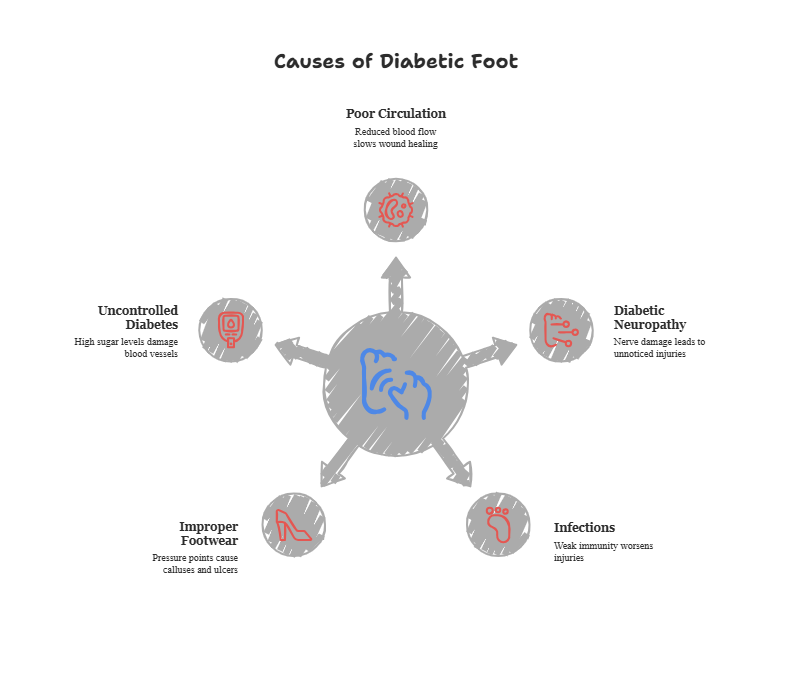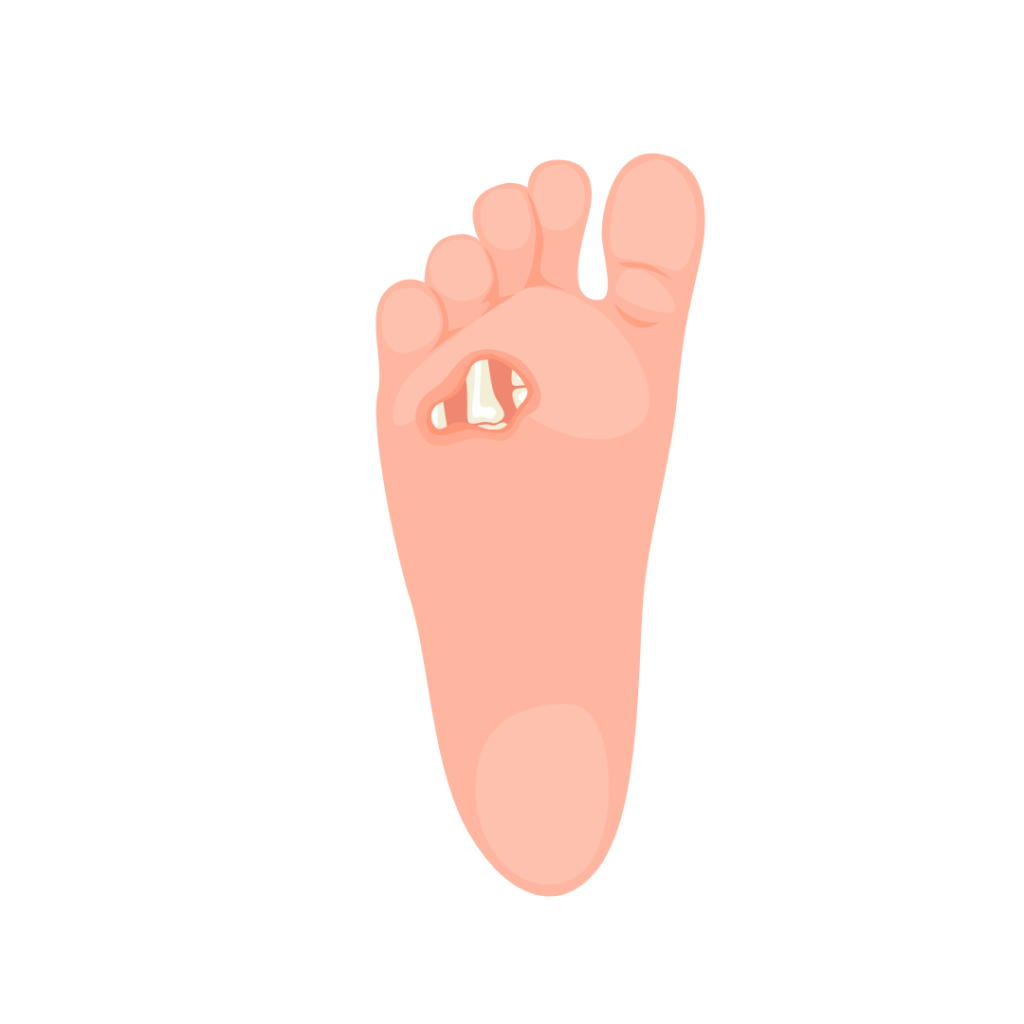Don’t Suffer in Silence
Get Relief from Piles in a Daycare!
Diabetic Foot Treatment in Bangalore

Living with diabetes requires extra care — especially for your feet. High blood sugar levels can damage nerves (diabetic neuropathy) and narrow blood vessels, reducing circulation and the body’s ability to heal. As a result, even a small blister, cut, or callus can turn into a serious diabetic foot ulcer if left untreated.
Globally, studies show that 1 in 3 diabetic patients may develop a foot ulcer during their lifetime. Of these, around 50–60% get infected, and nearly 1 in 5 severe cases can lead to amputation. In India, the prevalence of diabetic foot ulcers is estimated at 6.2%, and the amputation rate among ulcer patients can reach 31% — emphasizing the critical need for timely and specialized intervention. PMC+3Diabetes Journals+3JAMA Network+3
At Hari Laser Clinics, we provide comprehensive diabetic foot treatment in Bangalore, combining advanced wound care, vascular screening, laser-assisted healing, and infection control protocols. Our approach focuses on saving the limb, restoring function, and preventing recurrence — ensuring patients regain comfort, confidence, and mobility.
What Is a Diabetic Foot?
A diabetic foot is one of the most serious and preventable complications of long-term diabetes. When blood sugar levels remain elevated for prolonged periods, they damage the nerves (diabetic neuropathy) and blood vessels (microangiopathy) in the feet. This leads to loss of sensation, reduced circulation, and delayed wound healing, making even a small injury potentially dangerous.
Over time, minor cuts, calluses, or shoe bites may go unnoticed — turning into painful ulcers, deep infections, or gangrene. Without timely care, this can result in amputation or limb loss. However, with early diagnosis and specialized diabetic foot treatment in Bangalore at Hari Laser Clinics, these complications can be effectively managed and reversed before they become severe.
Our multidisciplinary team focuses on preserving the limb and restoring function through advanced wound healing, offloading therapy, and infection control. Early intervention not only accelerates recovery but also prevents recurrence and improves long-term foot health.
Causes of Diabetic Foot
Poor circulation (Peripheral Artery Disease): Narrowed blood vessels reduce oxygen and nutrient supply, slowing wound healing.
Diabetic neuropathy: Nerve damage causes numbness in the feet, so cuts, blisters, or burns often go unnoticed.
Infections: Even small injuries can worsen rapidly due to weak immunity and reduced blood flow.
Improper footwear: Tight or ill-fitting shoes create pressure points and repetitive friction, leading to calluses or ulcers.
Uncontrolled diabetes: Persistent high sugar levels damage blood vessels, lower immunity, and delay tissue repair.

Additional Risk Factors
Smoking: Constricts blood vessels and decreases oxygen supply, worsening circulation.
Obesity: Increases pressure on the soles, causing cracks and ulcers.
Long-term diabetes: Prolonged high sugar levels cause cumulative damage to nerves and tissues.
Poor hygiene: Dirty or moist feet increase the risk of bacterial and fungal infections.
Foot deformities (e.g., bunions or hammertoes): Cause uneven weight distribution and recurrent wounds.
Freedom from Your Diabetic Foot
Don’t Suffer Anymore!!

Book your Appointment!
Complications If Diabetic Foot Is Left Untreated
Neglecting early symptoms of diabetic foot ulcers can lead to life-altering complications. High blood sugar, poor blood flow, and delayed treatment allow infections to spread deeper into tissues, bones, and the bloodstream — increasing the risk of amputation.
At Hari Laser Clinics, Bangalore to prevent these severe outcomes through advanced wound care, infection control, and vascular management.
Severe infections (cellulitis or abscess): Bacteria spread from the skin into deeper layers, causing pain, redness, and pus formation.
Osteomyelitis: Infection can reach the bone, making healing extremely difficult without surgical intervention.
Tissue necrosis (gangrene): Loss of blood supply leads to tissue death, requiring emergency treatment.
Sepsis: Untreated infections can enter the bloodstream, becoming life-threatening.
Amputation: Chronic, untreated ulcers or gangrene may result in partial or full limb removal to save life.
Early diabetic foot ulcer treatment in Bangalore prevents these through wound cleaning, antibiotics, and circulation improvement.
Patients Often Ask:
When should I see a doctor for a foot wound?
If a wound shows redness, swelling, discharge, or fails to heal in 2–3 days, visit a diabetic foot care specialist in Bangalore immediately.
appear over 4–6 weeks
Symptoms of Diabetic Foot Problems
Early detection of diabetic foot symptoms is crucial to prevent ulcers, infections, and amputations. Diabetes affects both nerves and blood vessels (poor circulation), making the feet more vulnerable to injuries that heal slowly.
Recognizing these warning signs early and visiting a diabetic foot care clinic in Bangalore ensures faster recovery and prevents severe complications.
Slow-healing wounds or ulcers: Cuts or blisters that do not close within days may signal poor circulation.
Redness, warmth, or swelling: Often the first sign of infection or inflammation.
Burning or tingling sensation: Indicates early nerve damage due to diabetic neuropathy.
Numbness or loss of sensation: Dangerous because injuries may go unnoticed and worsen over time.
Discharge or foul smell: Suggests infection or tissue decay.
Dark or blackened skin: May point to gangrene and requires urgent diabetic foot treatment in Bangalore.
Foot deformity or change in shape: Could result from long-standing nerve or bone damage.
Ignoring these symptoms can lead to infection spreading to deeper tissues and bones.
At Hari Laser Clinics, our diabetic foot care specialists in Bangalore provide advanced wound management, infection control, and vascular therapies to stop disease progression and restore healthy mobility.
Diagnosis of Diabetic Foot at Hari Laser Clinics
Accurate diagnosis is the cornerstone of successful diabetic foot treatment in Bangalore. At Hari Laser Clinics, every patient undergoes a comprehensive, step-by-step evaluation to identify the exact cause, stage, and severity of the condition — ensuring precise and personalized care.
Clinical foot examination:
A thorough physical check identifies wounds, ulcers, calluses, corns, swelling, or deformities. Early detection prevents progression to infection or gangrene.
Neuropathy assessment:
Using monofilament and vibration tests, we check for loss of sensation or nerve damage — a key factor in diabetic foot ulcers.
Doppler study (vascular screening):
A non-invasive test to assess blood flow in arteries and veins of the feet. Reduced circulation signals higher ulcer and amputation risk.
Infection screening:
Wound cultures and sensitivity tests determine the right antibiotics to control infection effectively.
Blood tests:
Regular monitoring of blood sugar, HbA1c, and white cell count helps track healing potential and detect systemic infection.
Imaging (if needed):
X-rays or MRI scans may be advised to detect osteomyelitis (bone infection) or deep abscesses that delay healing.
Early identification of vascular insufficiency and neuropathy can prevent severe complications. Our integrated diagnostic approach helps initiate prompt diabetic foot ulcer treatment in Bangalore, reducing the risk of hospitalization or amputation.
Treatment Options for Diabetic Foot in Bangalore
At Hari Laser Clinics, we offer comprehensive diabetic foot treatment in Bangalore that focuses on healing, infection control, and limb preservation.
Each treatment plan is customized based on ulcer depth, blood circulation, and the patient’s overall diabetic condition — ensuring faster recovery and reduced recurrence.
Early intervention prevents complications. We use advanced wound cleaning (debridement), moisture-balanced dressings, and targeted antibiotics to eliminate infection and promote tissue regeneration.
These evidence-based methods mirror global diabetic wound care standards (IWGDF Guidelines).
To prevent pressure build-up on wounds, our specialists use:
Custom off-loading footwear or foot orthotics
Foam or hydrocolloid dressings
Negative Pressure Wound Therapy (NPWT), when required
This approach enhances circulation and allows wounds to close naturally – a major differentiator in advanced diabetic foot care in Bangalore.
If infections spread to deeper tissues, our clinic provides timely intervention through:
Early antibiotic therapy guided by culture results
Minor surgical cleaning (debridement) to remove dead tissue
Vascular evaluation to improve blood flow and oxygen delivery
In cases of gangrene, we coordinate with vascular specialists for endovascular or reconstructive procedures, helping avoid amputation.
For complex infections, we combine multi-modal care:
Intensive infection control
Blood sugar stabilization under supervision
Circulation restoration via medical or surgical methods
This integrated method ensures safe and sustained recovery — ideal for patients with advanced or recurrent diabetic foot ulcers.
At Hari Laser Clinics, our priority is limb preservation.
Through early diagnosis, off-loading, periodic reviews, and wound monitoring, we help most patients avoid major surgery altogether.
Regular follow-ups with our diabetic foot care specialist in Bangalore ensure early detection of any recurrence.
At Hari Laser Clinics, our goal is to heal wounds, restore mobility, and prevent amputations through early, specialized diabetic foot wound care in Bangalore.
With expert care, modern techniques, and patient-focused follow-up, we ensure safe recovery and lasting foot health.
Minimally Invasive vs Traditional Care
| Feature | Modern Diabetic Foot Care | Traditional / Delayed Care |
|---|---|---|
| Healing | Faster & smoother | Slow / non-healing |
| Pain | Minimal | High |
| Risk of Amputation | Very low | High |
| Hospital Stay | Short / outpatient | Longer |
Benefits of Early Diabetic Foot Treatment
Early intervention plays a vital role in preventing complications and ensuring faster recovery for patients with diabetic foot problems. At Hari Laser Clinics, Bangalore focuses on healing, infection control, and long-term foot health.
Prevents amputations: Early diagnosis and wound management stop infections before they spread to deeper tissues.
Accelerates healing: Advanced dressings and circulation-improving therapies promote faster tissue recovery.
Reduces pain and swelling: Minimally invasive procedures ease discomfort and promote mobility.
Restores normal walking: Early care helps regain balance and foot strength.
Prevents recurrent infections: Regular monitoring reduces the risk of chronic ulcers or gangrene.
Patients Often Ask:
Why is early treatment important?
Because prompt and specialized diabetic foot ulcer treatment in Bangalore prevents complications like gangrene or amputation and supports faster, safer recovery.
Pre-Care Instructions for Diabetic Foot Treatment
Proper preparation ensures safe, effective, and faster healing during your diabetic foot care treatment in Bangalore. Follow these essential steps before your procedure:
Control blood sugar: Stable glucose levels promote quicker wound healing and reduce infection risk.
Inspect feet daily: Check for cuts, blisters, or redness that may need attention.
Avoid barefoot walking: Prevent accidental injuries or infections caused by unseen objects.
Inform your doctor: Share details about ongoing medications, allergies, or other health conditions before treatment.
Post-Care Instructions for Diabetic Foot Treatment
After receiving diabetic foot ulcer treatment in Bangalore, proper aftercare helps prevent recurrence and promotes complete healing.
Keep wounds clean and dry: Prevents infection and supports natural tissue repair.
Change dressings as instructed: Follow your doctor’s advice on frequency and technique.
Complete your prescribed medicines: Finish the entire antibiotic or pain relief course for best results.
Use diabetic footwear: Special shoes or soles reduce friction and pressure during walking.
Attend regular follow-ups: Helps monitor healing and detect early signs of infection.
Recovery Timeline
Day 1–3: Wound cleaning & initial dressings
Week 1: Reduced swelling, infection under control
Weeks 2–3: Tissue rebuilding, pain subsides
After 1 Month: Most small wounds heal fully
Maintaining Results & Prevention of Diabetic Foot Problems
Maintaining proper foot care after diabetic foot treatment in Bangalore is crucial to prevent recurrence and long-term complications. Follow these proven strategies:
Control blood sugar levels: Consistently stable glucose prevents new wounds and supports healing.
Wear diabetic footwear: Soft, wide, cushioned, closed-toe shoes reduce friction, pressure, and injury risk.
Keep feet moisturized: Regularly apply foot cream to prevent cracks, dryness, and infections.
Stay hydrated: Proper hydration improves blood circulation and tissue health.
Regular check-ups: Visit your diabetic foot care clinic in Bangalore every 3–6 months for early detection of any issues.
About the Author - Dr. Varun Kumar J

MBBS, DNB (General Surgery), FIAGES, FMAS
Dr. Varun Kumar J,
MBBS, DNB (General Surgery), FIAGES, FMAS
General & Laparoscopic Surgeon | Laser & Varicose Vein Specialist
Dr. Varun Kumar J is an experienced Laparoscopic and Laser Surgeon in Bangalore with over 14 years of expertise in minimally invasive surgery. He specializes in piles, fissure, fistula, varicose veins, and hernia treatments using advanced laser techniques.
Known for his compassionate care and precision, Dr. Varun ensures every procedure is safe, simple, and stress-free for his patients.
Experience: 14+ Years
Hospitals: Medfine Hospital & Hari Laser Clinics, Bangalore.
Why Choose us for Diabetic Foot Treatment?
Advanced Laser Techniques
We use USFDA-approved laser treatments for painless and scar-free piles removal. These minimally invasive techniques ensure faster recovery and reduced pain compared to traditional methods.
Expert Care by Dr. Varun Kumar J
Dr. Varun Kumar J ensures each treatment is personalized for the patient’s needs, providing comprehensive care for long-term relief.
Quick Recovery
Most patients can resume normal activities within 24 hours due to our non-invasive procedures and fast healing.
Post-Surgery Support
Our dedicated team offers post-treatment guidance, including follow-ups and recovery tips to promote optimal healing.
Commonly Asked Questions
How can I prevent diabetic foot complications?
Preventive measures include regular check-ups with a diabetic foot doctor; in addition, proper foot care for diabetes, and furthermore, maintaining good blood sugar control.
Why is it important to see a specialist for diabetic foot treatment?
A specialist, like a diabetic foot doctor, has the expertise to diagnose and treat complex foot issues related to diabetes. Moreover, they can provide tailored care to prevent complications and effectively manage existing conditions.
How often should I have my feet checked if I have diabetes?
It’s recommended to have your feet checked by a healthcare professional at least once a year. However, more frequent visits may be necessary if you have existing foot problems or high-risk factors, such as neuropathy or poor circulation.
What should I do if I notice a wound or ulcer on my foot?
If you notice a wound or ulcer, it is important to seek medical attention immediately. In fact, early treatment can prevent infections and other complications. Additionally, keep the area clean, avoid putting pressure on the wound, and follow your doctor’s advice for care.
What are the common signs that I need to know about diabetic foot treatment?
Common signs include persistent foot pain, ulcers that don’t heal, numbness or tingling, swelling, changes in skin color, and infections. Moreover, early detection and treatment are crucial to prevent complications.
